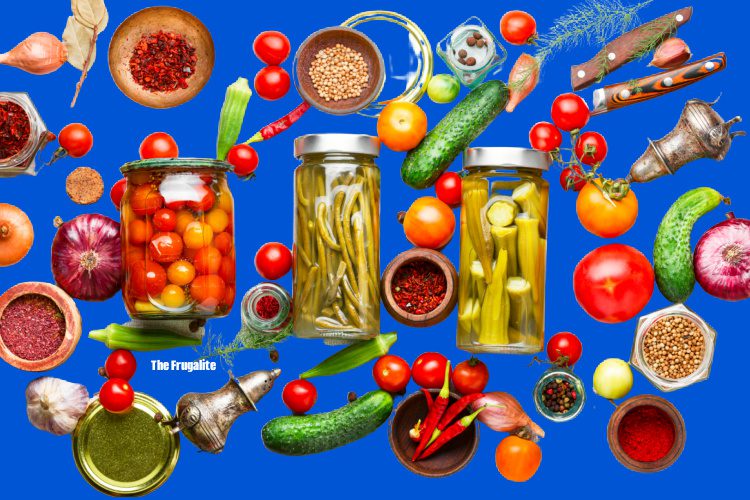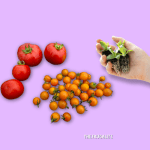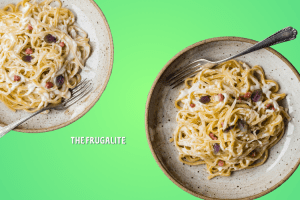(Psst: The FTC wants me to remind you that this website contains affiliate links. That means if you make a purchase from a link you click on, I might receive a small commission. This does not increase the price you’ll pay for that item nor does it decrease the awesomeness of the item. ~ Daisy)
by the author of The Seasonal Kitchen Companion and The Prepper’s Canning Guide
Over the past couple of weeks, I haven’t been around my computer much. That’s because we are working hard to live a more agrarian lifestyle. We’re trying to eat high quality food. And to do both of those things, you have to “make hay while the sun shines.”
That little proverb was first recorded in 1546, in John Heywood’s “A dialogue conteinyng the nomber in effect of all the prouerbes in the Englishe tongue” (This is the updated version.) Heywood wrote:
Whan the sunne shinth make hay. Whiche is to say.
Take time whan time cometh, lest time steale away.
Back when Heywood wrote down that little pearl of wisdom, every medieval farmer knew that if the hay was ready, it was time to cut it down, dry it, and gather it in order to feed their livestock throughout the winter. Not to do so was certain death, for without the livestock, they would starve. (source)
Of course, with the advent of “progress” we now live in a society in which nothing is really that urgent to most folks.
- If you need to feed your livestock, you go to the feed store.
- If you need a gift for someone, you can order it online. If you’ve waited until the last minute, you can run to the store on your way to the party.
- If you need to feed yourself, you go to the grocery store (or to one of dozens of restaurants). If you don’t want to get out of your pajamas, you can even have a hot meal delivered to your door in most places.
- If food in your fridge goes bad, you simply toss it out.
- If you need to stay warm, turn up the thermostat.
All of these things are more recent developments, of course. In days gone by…
- If you needed to feed your livestock, you made hay when it was ready, because if you left it, it would mold in the fields, rendering it inedible.
- If you needed a gift for someone, you thought about it in advance, and spent evenings by the fire carefully crafting that gift, savoring the secret and anticipating their delight.
- If you needed to feed yourself, you planted, nurtured, harvested, and you preserved, for in the cold winter months, the food would not be as close as the garden.
- If your food spoiled, you knew there would be lean days ahead, so you made great effort not to let that happen.
- If you lived in a climate with cold winters, you spent weeks each fall felling trees and chopping the wood into fireplace-sized chunks. And that was for the following year, after it had seasoned.
Meeting needs on demand is great, but is it really progress?
It means that everyone enjoys the same access to food whether they work hard or are lazy and unmotivated. Add in the EBT system, and some people don’t even have to earn money to buy food. It means that heat is as simple as turning a dial – and it’s against the law in many places to turn off the heat even when you haven’t paid your bill.
While I’m not advocating that people go hungry or cold, and I realize that there are circumstances in which all of us need a hand up now and then, the end result is that we have created a society with a poor work ethic because there is no sense of urgency about…anything.
High quality food for the winter at a budget price
In my family, we returned, by choice, to an old-fashioned lifestyle. Not only is this satisfying and healthy, it’s also friendly to our budget. My garden was not the best this year, so I’m reaping the rewards of other people’s gardens. Every week, I’m loading up on at least one thing and I’m preserving it for the months ahead. I’m trying to use every single bit of the food I’m acquiring. We aren’t much above our normal grocery budget of $100 a week, and my cupboards have never been this full going into the cooler months.
Part of the reason for this is that the farmers know about that whole “making hay” theory mentioned above. They know the produce is only at its peak for a short period of time, so it is sold inexpensively when it is at its most abundant.
For the consumer, it’s like any other type of investment – you want to buy when the commodity is at the lower end of the price spectrum. Later, when everyone else is paying $3.99 a pound for peaches, we’ll be eating our $1 a pound peaches. That’s a savings of $3 per pound.
If you were to apply that across the board, imagine the savings you’ll realize while still consuming high quality, local, sustainably grown food. If each family member ate the equivalent of a pound of produce per day (a low estimate) and the savings was an average of $3 per pound, that is $21 per person that you would save each week on the price of your grocery bill throughout the year. Multiply that by your number of family members and you will see how much your budget could potentially save.
Many people have become slaves to the rather absurd food system that provides us with “fresh” blueberries and asparagus at Christmas. Unfortunately, for our grocery bills, that means we are also slaves to the high prices charged for luxury produce outside of its normal season.
‘Tis the season for high-quality food preservation.
August (when I’m writing this) is a busy month, because all sorts of goodies are ripe. At the end of July and the first week of August, my daughter and I were out early every morning, busily picking blueberries at a U-pick place just a half mile down the road from us before the blazing sun made it too hot outside. But the work wasn’t over with the picking. Once we got home, these blueberries had to be washed, picked through, and processed.
Of course, our version of processed food is not like Big Food’s version. We pureed, strained, dried, and canned. We made jam, syrup, and dried berries. All in all, we went through 55 pounds of blueberries, and yummy blueberry pancakes and muffins will be ours this winter, at the low price of $1 a pound.
At the tail-end of blueberry season was peach season. We have processed 100 pounds of peaches, also at $1 a pound. (Here are 10 Awesome Ways to Preserve the WHOLE Peach.) We have canned peach slices, peach jam, peach pancake syrup, and spicy peach jam. We’ve made peach peel candy (which is delicious chopped up in a bowl of oatmeal, by the way), peach tea, and currently in a cool dark place lurks peach-infused vodka and whiskey, just waiting to be turned into liqueurs and decanted into pretty bottles for Christmas.
The peaches have tapered off, and we have begun working with pears. We canned pears in a mulling spice mix and pears in merlot wine. We boiled down the cores to make “pear cider”. We used the peels to make pear honey. We’re awaiting more pears for pear sauce. Hopefully, we’ll also manage to get our hands on some plums because I want to try my hand at some homemade plum sauce.
As fruit begins to wane, we are also working on preserving vegetables. I’ve pressure canned green beans and corn. I’ve dehydrated grated carrots and zucchini. I made dill relish from zucchini (Don’t tell my kids. They think they hate zucchini!). I’ve also canned shredded zucchini for use in future muffins.
And tomatoes…glorious tomatoes.
My favorite thing on the planet to add to my cupboards is my homemade tomato goodies. The lovely red orbs are just starting to come in, and I’m mixing the ones from my garden with heirloom varieties purchased from friends nearby. Our pantry shelves will include: tomato sauce with onions and garlic (no herbs – this is just for soup bases, etc), tomato juice, marinara sauce, pizza sauce, ketchup, tomato and basil soup, enchilada sauce, salsa, and dehydrated tomatoes preserved in oil. Not one tomato product throughout the year will need to be bought with this wonderful harvest I am putting away.
Soon, apple season will arrive and we’ll be busy making applesauce, pie filling. and apple butter. After that, pumpkins will be cubed and put in jars. We’ll be filling our freezer with meat, and some of it will go into jars in the form of chili, soup, and stew.
If you want all the details on what I preserve and how I preserve it, check out my guide, The Seasonal Kitchen Companion.
The season is short.
The thing is, this season is finite. In another two months, it will be slim pickings in the garden. I won’t be able to go to a nearby farm and pick up things inexpensively in bushels. I may not be able to find some foods at all if I stick to my goal of purchasing outside of the traditional grocery store. Furthermore, we can only eat so much of this fresh produce before it goes bad. There is a limited time during which it can be preserved for later. There’s no point in purchasing items by the bushel if you’re going to let half a bushel go to waste.
This means that if I’m not feeling well, if something comes up, or if I’m just not in the mood to can, I still have to can. We don’t live in a society where people push themselves to complete tasks anymore. It isn’t that they “can’t” complete a task in an allotted period of time – they have just gotten used to someone else completing those time-sensitive things, and they go on their merry ways and plan to get things as needed at the grocery store.
They don’t intend to heat with firewood, so they don’t have a huge pile of it in their driveway, requiring immediate stacking and covering to keep it dry and ready to warm their homes. It was actually heating exclusively with wood that made me so incredibly aware of the seasons and the jobs that are necessary during each of them. It was a matter of “stack wood now or freeze to death later.”
Fortunately, not everyone relies on the ‘just in time” system. Those of us who live by the seasons are aware that there is a time for work and a time for rest. We are fortunate to have back-up if our seals fail or our garden is unsuccessful, but we know those things may not always be around. We know that we have to make hay while the sun is shining, because tomorrow it may rain.
I’ll finish with some more ancient words of wisdom.
To every thing there is a season, and a time to every purpose under the heaven:
A time to be born, and a time to die; a time to plant, and a time to pluck up that which is planted;
A time to kill, and a time to heal; a time to break down, and a time to build up;
A time to weep, and a time to laugh; a time to mourn, and a time to dance;
A time to cast away stones, and a time to gather stones together; a time to embrace, and a time to refrain from embracing;
A time to get, and a time to lose; a time to keep, and a time to cast away;
A time to rend, and a time to sew; a time to keep silence, and a time to speak;
A time to love, and a time to hate; a time of war, and a time of peace.
What profit hath he that worketh in that wherein he laboureth? I have seen the travail, which God hath given to the sons of men to be exercised in it.
He hath made every thing beautiful in his time: also he hath set the world in their heart, so that no man can find out the work that God maketh from the beginning to the end.
I know that there is no good in them, but for a man to rejoice, and to do good in his life. And also that every man should eat and drink, and enjoy the good of all his labour, it is the gift of God.
Ecclesiastes 3, King James version
Do you preserve your own food?
Do you put back food for winter? Do you spend lots of time canning and dehydrating? What are your favorite methods of food preservation? Let’s talk about making hay while the sun shines in the comments.
Resources
Animal, Vegetable, Miracle: A Year of Food Life
About Daisy
Daisy Luther is a coffee-swigging, adventure-seeking, globe-trotting blogger. She is the founder and publisher of three websites. 1) The Organic Prepper, which is about current events, preparedness, self-reliance, and the pursuit of liberty; 2) The Frugalite, a website with thrifty tips and solutions to help people get a handle on their personal finances without feeling deprived; and 3) PreppersDailyNews.com, an aggregate site where you can find links to all the most important news for those who wish to be prepared. Her work is widely republished across alternative media and she has appeared in many interviews.
Daisy is the best-selling author of 5 traditionally published books, 12 self-published books, and runs a small digital publishing company with PDF guides, printables, and courses at Learn.TheOrganicPrepper.com You can find her on Facebook, Pinterest, Gab, MeWe, Parler, Instagram, and Twitter.












4 thoughts on “Want High Quality, Affordable Food? Make Hay While the Sun Shines.”
I’ve noticed a local store marks down their about to expired meat between 10-11 am every day. I found out by being in the store one morning and chatting with the meat manager as he was doing the mark downs. I generally look for the $1 coupons on the packages that are $2 ish so the price per package is low.ni look for the higher coupons on things like hamburger in the bigger package. I went by on Monday around 11am. I got a whole chicken that had been on sale for $.97 lb. It was $4 with the $3 off coupon. I got a pkg of pork ribs that was $4 ish, a pkg of stew meat, 3 pkgs of cube steak that were around $3 pkg, and some boneless pork chops that were less than $2 each. Now, I have the cube steak in the freezer to make Pioneer Woman’s steak sandwich. I roasted the chicken when I got home and ate some for supper. Took the rest of the meat off the bones, and put the bones in the instant pot to make broth. That night I canned 2 pints of chicken (used the broth in these), a pint of pork from the chops, and a pint of the beef stew meat. The next morning a 24 oz jar of the pork ribs (I want to see if I like them) a 12 jar of the rest of the pork, and 2 pints of chicken broth. I decided to can any free fruit/veggies I’m given. I’ve gotten peaches and plums recently. Alas, I’m not that great a gardener, but I made one batch of my favorite marinara sauce, and I’ve had plenty of zucchini, summer squash, and cucumbers to feed me, give away to friends, and bake some zucchini bread. I’m thinking I’ll let a few of the zucchini grow to a big size and try some of the ‘apple’ pie filling using zucchini.
Even if you can’t you pick and even then, you need to also add the cost of your time. Yes, at times, you have more time than money. And for some of us, more money than time. Even more money than time, a little research may pay off with ordering from a bulk store (or Mennonite run store). While we paid a bit more than double what you did for u-pick, we still got better tasting blueberries than the higher (sometimes over priced), crap shoot quality ones at the store. One local store somewhat specializes in fruits and veggies and has good sources. Either local/within the geographic area when in season, decent sources and fairly reasonable, to me, prices when not in season in our area. Interesting as of late – we can find frozen avocados (which is news to me lol) but not frozen asparagus – go figure.
While I’ve gardened for over two decades, I am just now learning how to preserve my harvest because in years past, I always just ate it fresh. Now, I think it’s important to know how to preserve for future, not just as a hobby. This year, I learned how to make refrigerator pickles (I haven’t graduated to canning pickles yet). I also water-bath canned some peaches (I bought 25lbs. when they were ripe). I froze U-pick blueberries. I bought a dehydrator and plan to try that next. The wood chopping description resonates with me because this summer, I stacked 18 face cords of wood that we felled and split last fall (with the help of chainsaws and wood splitters, which pioneers didn’t have). It should be seasoned and ready to use this winter. It took me a REALLY long time to stack by myself and I more readily appreciate the effort and strength that pioneers had to have to survive.
All the work involved in firewood is excellent exercise, even if you use a chain saw and splitter. And you just can’t beat wood heat.